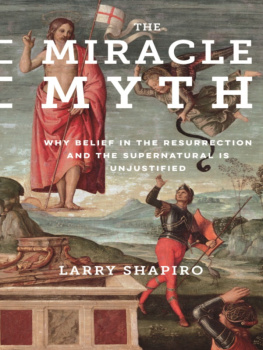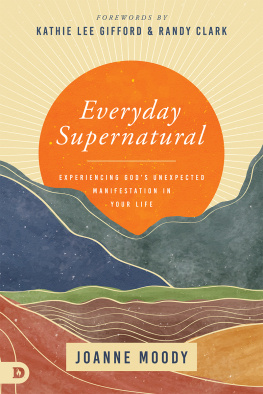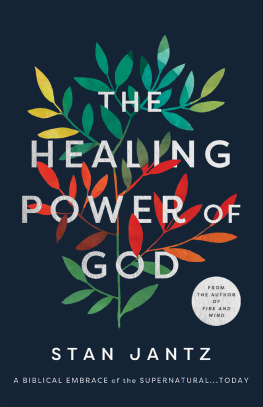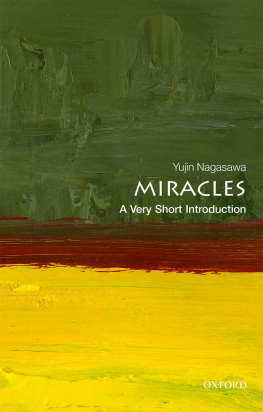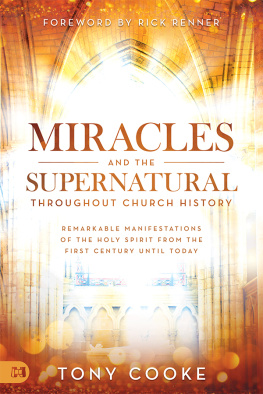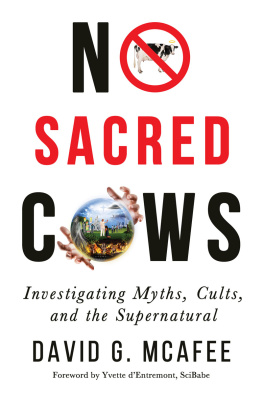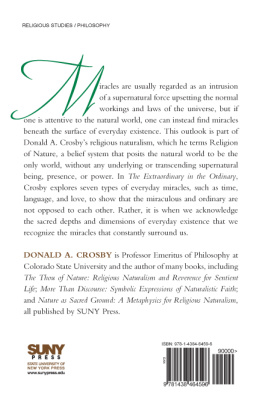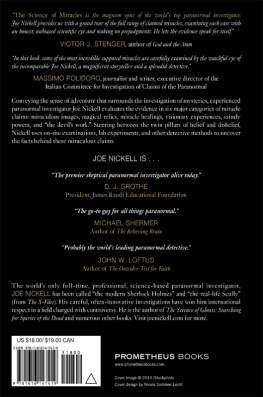Contents
THE
MIRACLE MYTH
THE
MIRACLE MYTH
WHY BELIEF IN THE RESURRECTION AND THE SUPERNATURAL IS UNJUSTIFIED
LARRY SHAPIRO
COLUMBIA UNIVERSITY PRESS New York
Columbia University Press
Publishers Since 1893
New York Chichester, West Sussex
cup.columbia.edu
Copyright 2016 Columbia University Press
All rights reserved
E-ISBN 978-0-231-54214-2
Library of Congress Cataloging-in-Publication Data
Names: Shapiro, Lawrence A., author.
Title: The miracle myth : why belief in the Resurrection and the supernatural
is unjustified / Larry Shapiro.
Description: New York City : Columbia University Press, 2016. | Includes
bibliographical references and index.
Identifiers: LCCN 2016002183 | ISBN 9780231178402 (cloth : alk. paper) |
ISBN 9780231542142 (e-book)
Subjects: LCSH: Supernatural. | Miracles. | Belief and doubt. | Credulity. | Psychology.
Classification: LCC BL100 .S43 2016 | DDC 202/.117dc23
LC record available at https://lccn.loc.gov/2016002183
A Columbia University Press E-book.
CUP would be pleased to hear about your reading experience with this e-book at .
COVER DESIGN: CHANG JAE LEE
COVER IMAGE: RESURRECTION OF CHRIST BY RAPHAEL
ALFREDO DAGLI ORTI / THE ART ARCHIVE, CORBIS
To my parents, Martin and Ann, who gave me the miracle of life but, more importantly, raised me right
CONTENTS
The results show that 47 percent of participants completely agree and another 32 percent mostly agree. If the sample is representative, this means that nearly four out of five American adults believe in miracles. Obviously, with so many people in agreement, belief in miracles must cut across all sorts of the usual categoriesliberal and conservative, young and old, gay and straight, southern and northern. It turns out that there is no single type who believes. We cant even conclude that believers are particularly religious. Further analysis of the survey reveals that even nonreligious peoplethose who dont identify with any particular religion and never attend houses of worshipbelieve in miracles. Even atheists and agnostics believe in miracles! Miraclesdont belong only to the very conservative religious fringe. They are accepted as fact by a huge majority of people in the United States.
Whats more, the context in which the question about miracles was asked made clear that the miracles being referred to were the BIG ones. Were not talking simple coincidences, as in the time you sat on an airplane next to a stranger who turned out to be the person who would interview you for a job later that day. Were also not talking about merely unexpected occurrences, as in when the U.S. Olympic hockey team beat the Russians in the so-called Miracle on Ice. Coincidences and other unlikely events are not what come to mind when thinking about miracles in ancient times. Seas parting on command, bodies rising from the dead, water suddenly turning into winethese are the miracles that we associate with ancient times, and they make coincidences and improbabilities, surprising as they may be, seem rinky-dink by comparison.
Heres another set of questions the Pew survey asked: Do you think there is a heaven, where people who have led good lives are eternally rewarded? and Do you think there is a hell, where people who have led bad lives and die without being sorry are eternally punished? Although the focus of this book is mainly miracles, I am mentioning these questions about heaven and hell because the way the questions were answered will help me to introduce one of my main themes. Of those surveyed, 74 percent believe that heaven exists, 59 percent believe in hell. Speaking now as a trained philosopher, I find this result very puzzling. Let me explain why.
Philosophers like to argue that when people believe something, they should have a reason to do so. If you believe that rain is on the way, you should have a reason that makes such a belief appropriate. Maybe you see dark clouds on the horizon, or maybe you heard a forecast on the radio earlier in the day. Likewise, if you believe that your car needs to go to the shop, you again should have a reason, such as that grinding noise you hear when you put it in reverse or the warning lights on the dashboard that flash whenever you start the engine. Asking for a reason to believe something doesnt seem like a big deal. Even a bad reason is a reason. Maybe you think its going to rain because your horoscope said so or because your dog is barking. These reasons may not be great ones, but theyre something. They show that some effort is being made to justify your belief, even if the effort turns out not to be sufficient to that task.
I bet most people understand that they have a responsibility to give a reason when someone asks them why they believe that rain is on the way or why they believe that their car needs to be repaired. I just believe is hardly a satisfying answer. I think I would resent someone who convinced me to carry an umbrella to work if he had no reason to believe that it would rain, and I know I would resent someone who persuaded me to spend money to fix a car that she had no reason to think was broken.
But now lets consider the survey responses to the questions about heaven and hell. The data show that more people believe in heaven than people who believe in hell (specifying exactly how many more is difficult because some respondents refused to answer the questions or checked I dont know). I find this discrepancy odd because the existence of heaven seems no more or less likely than the existence of hell. Whatever reason to believe that heaven existsits a reward God offers to those who have lived a worthy lifeseems to suggest quite naturally a reason to believe that hell also doesas punishment for those who do not live the life God commands. Because reasons for believing in heaven seem no better or worse than reasons to believe in hell, why do so many Americans accept the idea of one but not the other?
I do have an explanation for the survey results, but I confess that its not one that makes me happy. In fact, its an explanation that curls most philosophers nose hairs. Here it is: more people believe in heaven than in hell not because they have reasons to believe in one and not the other but because they want it to be true that theres a heaven and dont want it to be true that theres a hell. In other words, the people who believe in heaven but not hell have abandoned reason and instead hang their belief on nothing more than hopehope that because the idea of heaven is so nice, it must exist, and hope that because the idea of hell is so horrible, it must not exist. I think this dependence on hope, believing what you really want to be true and not believing what you really want to be false, explains the survey results. Put more simply, in a way thats not at all surprising, people believe what they want to believe.
Whats wrong with believing what you want to believe? Why is having a reason to believe something better than simply believing it because you want it to be true? These are questions that philosophers dont usually try to answer because, as professional reasoners, most of them just assume that everyone shares a devotion to having reasons. But we can say a few things about why its wrong to believe something simply because you really want it to be true.

